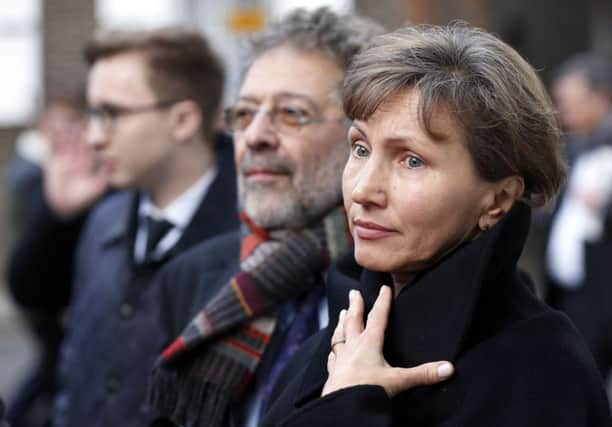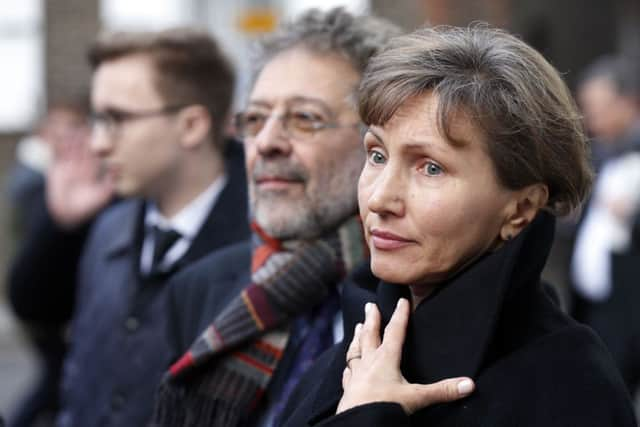Nuclear terrorism: How Litvinenko died ‘trying to expose Putin corruption’


Giving an opening statement to the inquiry on its first day, Ben Emmerson QC said the death of Mr Litvinenko, who was affectionately known as Sasha, was “an act of unspeakable barbarism”.
He said: “Mrs Litvinenko has as you know too well fought long and hard over many years to reach this day. The opening of a public inquiry into the political assassination of her husband in London.
Advertisement
Hide AdAdvertisement
Hide Ad“That murder was an act of unspeakable barbarism that inflicted on Sasha Litvinenko the most painful and lingering death imaginable.


“It was an act of nuclear terrorism on the streets of a major city which put the lives of numerous other members of the public at risk.”
Mr Emmerson said that Mr Litvinenko was murdered for “trying to expose the corruption among the cabal surrounding Vladimir Putin”.
The QC described Russia as a “mafia state” and pointed to the “intimate relationship between the Kremlin and organised crime”.
Advertisement
Hide AdAdvertisement
Hide AdHe told the inquiry: “Mr Litvinenko had to be eliminated not because he was an enemy of the Russian state itself and certainly not because he was an enemy of the Russian people but because he had made an enemy of the close knit group of criminals who surrounded and still surround Vladimir Putin and keep his corrupt regime in power.
“One of the key questions this inquiry is setting out to answer is whether there is sufficient evidence to prove in an independent judicial inquiry what everyone else already knows - that the murder was ordered by senior officials of the Russian state, that is, by the Kremlin.”
Mr Emmerson said that other theories about the killing were “unfounded and absurd for which there is no evidence” and claimed they would “very easily” be dismissed.
He added that there was not the “slightest doubt” about the identity of those who carried out Mr Litvinenko’s murder.
Advertisement
Hide AdAdvertisement
Hide Ad“Mr Litvinenko was murdered by Andrei Lugovoi and Dmitri Kovtun,” he said.
A real-life spy story...
Alexander Litvinenko’s biography reads like a template for a John Le Carre character.
Known affectionately as Sasha, he was a secret agent, political dissident, author, a husband and a father.
But the life and times of Alexander Litvinkenko were brought to an abrupt end in November 2006 after he was poisoned at the age of 43 in an exclusive Mayfair hotel.
Advertisement
Hide AdAdvertisement
Hide AdThe road that led him from Cold War secret serviceman to a London hospital bed began more than 20 years ago.
He first became a security agent under the Soviet-era KGB in the late 1980s, after transferring from the Russian military. It is now known as the FSB, the Federal Security Service, specialising in organised crime and counter-terrorism.
A decade later he made a life-changing decision to voice concerns about deep-rooted corruption in the FSB.
In 1997, he publicly exposed an alleged plot to assassinate the then powerful tycoon Boris Berezovsky.
Advertisement
Hide AdAdvertisement
Hide AdIt was around this time he fell out with Vladimir Putin, then head of the FSB, now President of Russia, and was sacked, arrested and charged with corruption.
Eventually he was acquitted and in 2000 he fled to the UK - in violation of an order not to leave Moscow - where he successfully claimed asylum.
From his new position of relative safety, he became a relentless critic of Mr Putin’s regime, co-authoring several books.
One, titled ‘Blowing Up Russia: Terror From Within’, accused Russian agents of co-ordinating a series of apartment block bombings in 1999 that left more than 300 dead.
Advertisement
Hide AdAdvertisement
Hide AdMoscow blamed the attacks on Chechen rebels. They are believed to have helped swing public opinion behind Russia’s war in the breakaway state.
Possibly financially supported by billionaire Mr Berezovsky, Mr Litvinenko also appeared in public alongside other opponents of Mr Putin.
He denounced the war in Chechnya as a crime, called for Russian troops to be withdrawn and said compensation should be paid to Chechens.
But he also knew that as an outspoken and high-profile critic of Mr Putin, his life and those of his family, wife Marina and son Anatoly, were at risk.
Advertisement
Hide AdAdvertisement
Hide AdWell aware of the methods of those who work in the shady intelligence underworld, Mr Litvinenko took measures to protect himself.
His suburban address was secret, he changed his phone number regularly and he met contacts at busy, public locations.
But his caution - in the end - was not enough.
Mr Litvinenko started investigating the October 2006 murder of journalist Anna Politkovskaya, another opponent of the Kremlin.
On November 1, he met with an Italian security expert, who handed him alleged evidence concerning the murder of Politkovskaya.
Advertisement
Hide AdAdvertisement
Hide AdLater the same day, he met former KGB agents Andrey Lugovoy and Dmitry Kovtun for tea in the Millennium Hotel in west London.
After the meeting, he suddenly fell ill and was taken to hospital. His illness was later attributed to poisoning with radionuclide polonium-210 after the Health Protection Agency found significant amounts of the rare and highly toxic element in his body.
Three weeks after the meeting, Mr Litvinenko’s heart failed and his official time of death was given as 9.21pm at University College Hospital in London. He was buried in Highgate cemetery in north London.
Lugovoi and Kovtun have been identified as the prime suspects in the killing, but both deny any involvement and remain in Russia. Extradition requests from UK authorities were rejected by the Russians.
Advertisement
Hide AdAdvertisement
Hide AdLugovoy is now a Russian politician and deputy of the State Duma, the lower house of the Russian parliament for the Liberal Democratic Party of Russia.
Nearly seven years after Mr Litvinenko’s death, Mr Berezovsky was found dead at his home in Berkshire in March 2013, after spending years in exile in Britain. A post-mortem examination said his death was consistent with hanging - but the coroner recorded an open verdict.